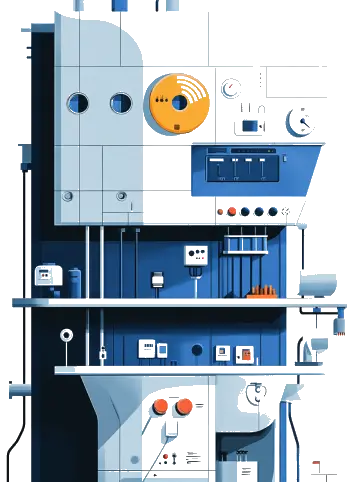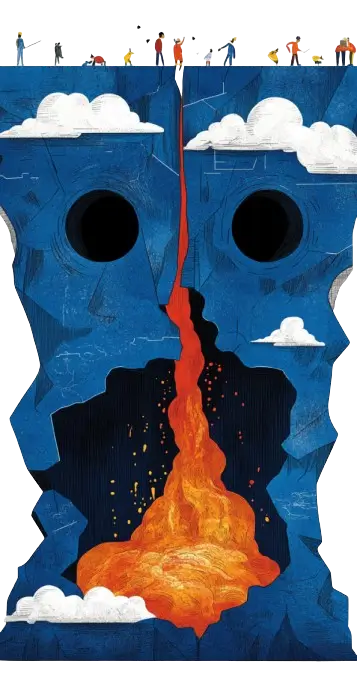
Every year, the Shade Tree Fund identifies a handful of applied climate technologies for concentrated donations to accelerate scientific teams. These focus areas are determined through a collaborative analysis of emerging trends, technological advancements, and potential impact on climate change mitigation or adaptation.

Fusion energy promises virtually limitless, clean power, potentially revolutionizing our energy landscape and dramatically reducing greenhouse gas emissions.
We focus on accelerating the development of commercially viable fusion reactors. Our efforts include funding cutting-edge research in plasma confinement, supporting the development of advanced materials for reactor components, and investing in innovative approaches to fusion ignition and control.
We've partnered with leading research institutions and private sector pioneers to establish the Fusion Accelerator program. This initiative aims to overcome key technical hurdles, such as achieving net energy gain and developing efficient methods for heat extraction. By fostering collaboration between academia and industry, we're working to shorten the timeline for practical fusion power deployment.

SRM techniques could potentially mitigate some effects of climate change by reflecting a small portion of sunlight back into space, buying crucial time for other mitigation efforts to take effect.
Our approach to SRM is twofold: we support research into various SRM technologies while simultaneously funding studies on their potential environmental impacts and ethical implications.
The SRM Ethics and Governance Initiative, launched in partnership with leading climate scientists and ethicists, aims to develop robust frameworks for responsible SRM research and potential deployment. We're also funding small-scale field experiments to better understand the efficacy and risks of different SRM approaches, including stratospheric aerosol injection and marine cloud brightening.

Next-generation materials have the potential to revolutionize clean energy production, energy storage, and carbon capture technologies.
Our Advanced Materials Innovation initiative facilitates collaboration between materials scientists, engineers, and climate technologists. We're particularly focused on funding research into:
1. High-temperature superconductors for more efficient power transmission
2. Novel membranes for enhanced CO2 capture
3. Advanced battery materials for grid-scale energy storage
4. Sustainable alternatives to cement and steel for the construction industry
By fostering open innovation and rapid prototyping, we aim to accelerate the journey from lab discovery to practical application in climate-critical sectors.

Advanced geothermal technologies have the potential to provide baseload clean energy on a global scale, tapping into the Earth's vast heat resources.
Our Geothermal Exploration Fund supports innovative approaches to geothermal energy extraction, with a focus on enhanced geothermal systems (EGS) and closed-loop technologies. We're funding projects that aim to:
1. Develop more efficient drilling techniques for deep geothermal reservoirs
2. Improve reservoir stimulation methods to increase permeability and heat extraction
3. Advance technologies for geothermal prospecting to reduce exploration risks
We've partnered with geological survey organizations and energy companies to create a global database of geothermal resources, aiming to accelerate site selection and project development worldwide.

Restoring and enhancing natural ecosystems is crucial for both carbon sequestration and biodiversity preservation, offering a powerful tool in the fight against climate change.
Our Biosphere Remediation focus area seeks to fund innovative approaches to large-scale ecosystem restoration and carbon sequestration. Key focus areas include:
1. Advanced reforestation techniques, including drone-based seed planting and AI-optimized species selection
2. Ocean fertilization and seaweed farming for enhanced marine carbon capture
3. Soil carbon enhancement through biochar and microbial technologies
4. Wetland and peatland restoration methodologies
We're also supporting the development of advanced monitoring systems using satellite imagery and IoT sensors to quantify the carbon sequestration impact of these projects accurately.

Revolutionizing manufacturing processes is essential for reducing industrial emissions and creating a circular economy.
Our Advanced Manufacturing Sustainability Index is driving innovation in sustainable production methods. We're funding projects that focus on:
1. Additive manufacturing techniques to reduce material waste
2. AI-optimized production processes for energy efficiency
3. Development of bio-based and recyclable materials for manufacturing
4. Carbon-negative production methods, including CO2 utilization in materials
We've established partnerships with industry leaders to pilot these technologies, aiming to demonstrate their feasibility and encourage wider adoption across various sectors.

Developing resilient and sustainable agricultural practices is crucial for food security in a changing climate while also reducing agriculture's environmental impact.
Our Crop Resilience Initiative supports research and development in:
1. Gene editing techniques to create drought and heat-resistant crop varieties
2. Vertical farming and controlled environment agriculture for urban food production
3. Precision agriculture technologies to optimize resource use and reduce emissions
4. Development of perennial grain crops for enhanced soil health and carbon sequestration
We're collaborating with agricultural research institutions and smallholder farmer organizations to ensure that these innovations are both scientifically sound and practically applicable in diverse global contexts.

Developing efficient and scalable methods to remove and store atmospheric carbon dioxide is crucial for achieving net-zero emissions and potentially reversing climate change.
Details: Our Carbon Capture Initiative supports innovative approaches to both natural and technological carbon sequestration. Key focus areas include:
1. Direct Air Capture (DAC) technologies with improved energy efficiency
2. Enhanced weathering techniques using crushed minerals
3. Novel biological approaches, including genetically engineered plants and algae
4. Advanced geological storage methods for long-term carbon containment
We're funding projects that aim to reduce the cost of carbon capture and storage while increasing its scalability and effectiveness. Our goal is to accelerate the development of solutions that can be deployed globally to significantly impact atmospheric CO2 levels.

Innovation in marine microbiology has the potential to draw down carbon, regulate atmospheric composition, and stabilize world fisheries.
Our Marine microbiology funding focus seeks to harness the power of the smallest marine life to drive change on a global scale. Key focus areas include:
1. Identify and cultivate oxygen-producing phytoplankton that thrive in warmer waters, reducing the probability of a global oxygen deficit in a warming world.
2. Accelerate bioremediation of polluted coastal areas, enhancing fisheries production.
3. Identify, cultivate, and distribute resilient zooplankton to stabilize changing marine ecosystems from the bottom up.
4. Counter ocean acidification with proton-sequestering metabolic chains.